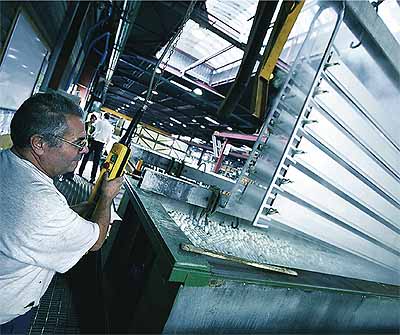Sapa Profiler
A wealth of solutions from Sapa Profiler
Sapa Profiler AB is the Swedish wing of the Sapa Group, a global producer of aluminium products and services.
As recently as June 2007, the Sapa Group became the face of the merged leading global aluminium companies, Orkla and Alcoa. Orkla owns 54 per cent of the group, and Alcoa owns 46 per cent operating control. The group has a market share of 19 per cent in Europe, and 27 per cent in North America, confirming its position as an industry heavyweight by generating $4.2 billion in combined net sales in 2006. Sapa employs over 12,000 people worldwide, with operations across Europe and North America, and a presence in Asia. The combination of the two companies to form Sapa is advantageous, as president Ole Enger outlines: “The company is creating a global market leader in aluminium profiles that has potential for further growth. Sapa will create value through close co-operation with its customers and efficient operations. The company is combining the best from the two organisations.”
In 2003, Sapa Profilers celebrated 40 years of entrepreneurial spirit. Formed by businessmen Lars Bergenheim and Nils Bouveng in the Vetlanda region in 1963, the company flourished under the mantle of being an exception to the normality of the Swedish industrial tradition, being one of the few companies established in Sweden after the Second World War with the inherent strength to develop into a global business. Indeed, Sapa swiftly became the third largest manufacturer of aluminium profiles, and renowned for its special focus on developing creative, value-led aluminium solutions for its clients. Bergenheim and Bouveng experimented with the potential of aluminium in the US before moving operations to Sweden, completing studies to make processes costeffective and competitive. Speed and flexibility underpinned the direction of Sapa’s operations, which caught the attention of competitors Gränges, who purchased the company in 1976. Sapa’s dedication in working closely with customers, keeping promises, and having confidence in individual employees was renowned throughout Sweden, and increasingly in Europe.
This strong market position was consolidated by Electrolux taking over Gränges in 1980 – a move that triggered rapid international expansion. At the end of the 1990s, the business was streamlined, and the production of aluminium products formed the backbone of the company, changing the name to Sapa in recognition of this. The company’s success lies in consistent application of corporate dealings, between both employees and clients, which is an ethos Sapa seeks to preserve, mature, and develop. At the centre of this operation is an overriding emphasis on quality. This means making constant improvements to products and services, making sure that a project is completed adequately from the start, and paying attention to the details of tasks.
The assurance of a quality array of products is central to Sapa’s development globally, and the Vetlanda facility is no different. At all levels of the company, employees focus on understanding customer’s profiling and service needs. This is displayed by Sapa’s faultless catalogue of products, few complaints throughout its history, innovative design solutions, attractive surface treatment options, and efficient logistics. In 2004, the company announced that it was applying the ‘Genesis’ business model to its operations, a variant on the Toyota Production System. The model believes all activities can be improved further, and that quality is established via human behaviour. Under the maxim ‘no chain is stronger than its weakest link’, Sapa aims to progress through using common sense, good order, and the elimination of waste – particularly overproduction, waiting times, and the inadequate handling of errors.
Using Genesis has improved the quality of Sapa’s products and services, delivering reliability, and making sure that the internal decision-making process is streamlined. This system, when applied to management, has no end – it is a constant, evolving process, aimed at delivering consistent quality and lead times. The emphasis on achieving no errors in the day-to-day running of the company is applied at all levels, especially within management, to ensure both productivity and quality. This dedication has provided Sapa with the following accreditation: ISO 14001 for environment in 2004; ISO 9001 award for quality in 2000; and the ISO/TS 16949 for quality components and support functions.
It is the company’s drive to ensure that aluminium products are used as an alternative to steel and plastics, both as components and as finished articles. Sapa is keen to highlight the variety of applications of its products, particularly in their energy saving capabilities and in their lighter weight. This advertisement of aluminium’s saleable properties has been central to the company’s ‘Beyond the Profile’ workshops, held in Vetlanda. Professional industrial, interior and furniture designers were invited to participate in a conference designed to focus on the creative possibilities of aluminium. These workshops emphasised the belief that everyone can be creative, and participants learned how to group brainstorm the possible uses of aluminium products effectively, flexibly, and spatially. It is the aim of Sapa to increase the knowledge of the capabilities of aluminium profiles, and its market position and range of products and services has ensured the company’s growth and continued success.
Sapa Profiler
Products: Lightweight aluminium profiles
Sites: Vetlanda, Sjunnen and Finspång, Sweden
Employees: 1700 (Sweden) 7500 (worldwide)
www.sapagroup.com
